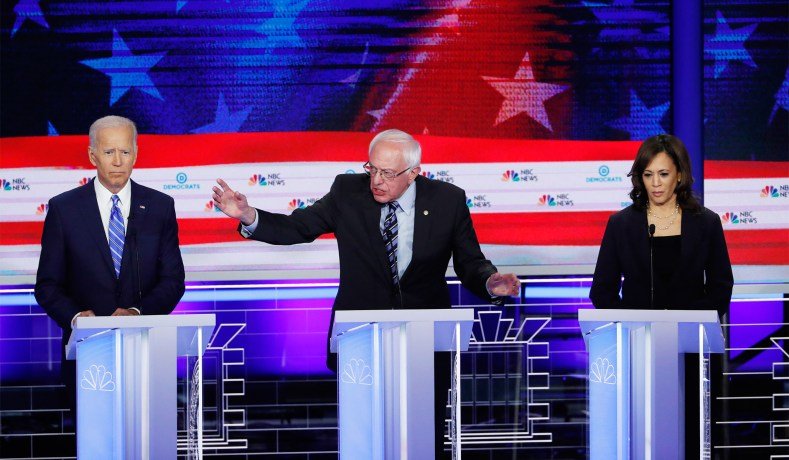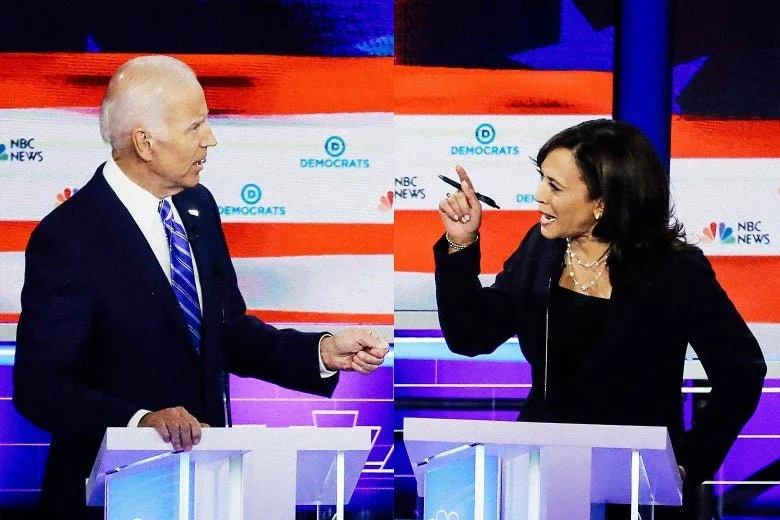I'm Gen Z and a First-Time Voter. This Is What the Debates Mean to Me.
This is my first election. My first real election. I remember President Obama's first election. I was sitting on the carpet in front of the bulky television in our living room. My hands gripped red and blue crayons as I colored an electoral map from school as the results rolled in. When the election was finally called for Obama, my parents yelped and started to cry. I couldn't quite wrap my second-grade head around the true significance of Obama's feat. Leading up to Election Day, we had mock debates in school and we learned about all the presidents. I was obsessed. And for the first time, there was a guy who looked like me in that long line of presidents.
Fast forward eleven years. Here we are in the middle of the 2020 Democratic Primaries. For context, in the last election, I watched every Republican debate during the primaries, the Vice Presidential debate, and every Presidential Debate. I also watched the Presidential Debates in the 2012 Presidential Elections. The way I understand it, these debates are supposed to offer enough information about each candidate to help the general public glean some knowledge about their platforms.
The debates this year have been kind of useless. I, luckily, am a first-time voter with a considerable knowledge about the political process, contemporary political issues, American history, and the ability to easily search for more information whenever I want to. The reality is, the average American voter (first-time voters included) do not have all, or even a combination, of these attributes. More often than not, a lot of us really don't care.
With the field going from over 20 candidates to 12, "confusing" isn't even the word to describe the primaries. Here is a brief list of everything that's wrong/confusing about these debates:
1. Healthcare
(Mike Segar/Reuters)
We get it. The healthcare situation in this country is very important. I just don't think it's effective to spend an hour and change on healthcare during three-hour debate. Especially, when there are a plethora of other topics that are just as important and/or intersect with the healthcare issue. Furthermore, so many of the candidate's plans are so close in general style and substance that they end up nitpicking word choice instead of actually debating. Most of the plans start to blend and by the end of the debate. You almost always end up more confused about healthcare than you were at the beginning of the debate. At this point, just have a separate healthcare debate or town hall, because healthcare has dominated every debate so far and it's simply not working. TALK MORE ABOUT THE CLIMATE CHANGE AND THE PRISON INDUSTRIAL COMPLEX AND VOTER SUPPRESSION!! PLEASE.
2. Enough with the Kamala/Warren/Biden/Bernie lovefest.
Photo illustration by Slate Photo by Drew Angerer/Getty Images.
I understand that Sen. Kamala Harris, Sen. Elizabeth Warren, Sen. Bernie Sanders, and former Vice President Joe Biden are the frontrunners for the Democratic nomination. But the moderators at every debate seem to forget that there are many other candidates on the stage. Most of the people who cared enough to tune in to these debate know who the frontrunners are. We should be using this time to help the lower-polling candidates expand their platform and share their views. Outside of opening statements, it takes way too long to hear candidates like Andrew Yang, Julián Castro, etc. No matter how you feel about these candidates, I think we can agree that a fair and effective debate should be equitable in the sense that all candidates get a relatively equal opportunity to be heard. In the September debate, other than the four aforementioned frontrunners, Sen. Cory Booker was the only other candidate to reach the Top 5 of candidates with the most speaking time. For the most part, the higher-polling candidates get the most speaking time. The combined speaking time of Sen. Amy Klobuchar and Andrew Yang is around the same as Sen. Elizabeth Warren's total speaking time and less than Biden's total speaking time. Yes, better debaters will speak more, but there are also fundamental issues with debate moderation that have a considerable impact.
3. The DNC needs to step back
The DNC thresholds for this debate were 130,000 unique donors (with 400 unique donors per state in at least 20 states) and at least 2% support in four DNC-approved polls released between June 28 and Oct. 1. At the most basic level, these thresholds are annoying because they inherently disrupt the continuity of the debates. Billionaire executive Tom Steyer and Rep. Tulsi Gabbard did not meet the qualifications for the last debate, but they will be on stage tonight. These thresholds are more like punishments for candidates without big social media platforms, national profiles, and donor bases. The DNC is actively trying to steer the nomination in their own interests with these thresholds, and this prevents the general public from getting a sense of all the platforms and candidates that are fighting for their vote. I think thresholds are important. We can't have 40 candidates on a debate stage, but at the same time, these thresholds are beginning to feel more punitive than helpful. They need to be reworked.
So, in short, the debates are a cute gesture. It's nice to see that some remnants of American democracy are still somewhat functioning. But between issues in the format of these debates, an uneven focus on some issues over others, and the influence of stronger institutions, the debates are essentially meaningless. At best, these debates have provided quality entertainment. Kamala Harris' "that little girl was me," monologue, Bernie's "I wrote the damn bill" moment, Biden's many blunders, and Marianne Williamson's entire persona have gifted us memorable memes. More seriously, the debates have offered us truly interesting policy stances like Julián Castro's call to make illegal border crossing a civil offense or Beto's gun buy-back suggestion. Unfortunately, moments like these, and actual nuanced debate on pertinent topics, are drowned out by three hours of stale questions and painfully obvious attempts at viral soundbites.
As a first-time voter, I don't think the debates have helped formed my opinion as much as my own research has. Hopefully, we can fight through this mess, pick a worthy candidate, beat Trump, and fix the debate system by 2024.


